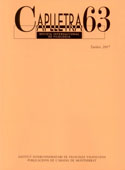A grammar for teaching: characteristics and objectives
DOI:
https://doi.org/10.7203/caplletra.63.10400Keywords:
metalinguistic reflection, grammatical concepts, pedagogical gramma, grammar teaching, form and use Abstract
Abstract
Learning language at school means learning grammar as a conscious and explicit knowledge about language, as a means to reflect on language use aiming at using language more consciously and in accordance with the different situations of discursive interplay, either from the perspective of the agent (speaker or a writer) or from the perspective of the interlocutor (a reader or a conversation partner). This article deals with the term pedagogical grammar (PG) explicitly referring to this goal, but also considering other aspects that a PG should be addressing: as a framework of reference to the social norms concerning language use, rejecting the idea of becoming a bunch of fixed and imposed norms; as a framework of reference to build the syntactic structures that the language system allows; as a tool helping to select among these structures to match the user’s discursive perspective; and as a means to progressively build and systematize reliable knowledge of grammatical concepts. In this respect, procedural and methodological aspects become unavoidable issues to conceive grammatical knowledge as a tool to think reflectively in learning situations at school.
 Downloads
Downloads
Downloads
Published
How to Cite
-
Abstract1485
-
PDF (Català)1239
Issue
Section
License
Authors submitting work to Caplletra for publication must be the legitimate holder of the usage rights. Legitimacy for the purposes of publishing the work must also include images, tables, diagrams and any other materials that may complement the text, whether they are the author of such material or not.
Copyright: on publishing their work in the journal, the author grants Caplletra. Revista Internacional de Filologia usage rights (reproduction, distribution and public communication) for both the paper printed version and for the electronic version.
All work published in Caplletra is covered by the Creative Commons license type Attribution-NonCommercial-NoDerivatives 4.0 (CC BY-NC-ND 4.0).
RESPONSABILITY
Caplletra. Revista Internacional de Filologia does not necessarily identify with the points of view expressed in the papers it publishes.
Caplletra. Revista Internacional de Filologia accepts no responsibility whatsoever for any eventual infringement of intellectual property rights on the part of authors.






